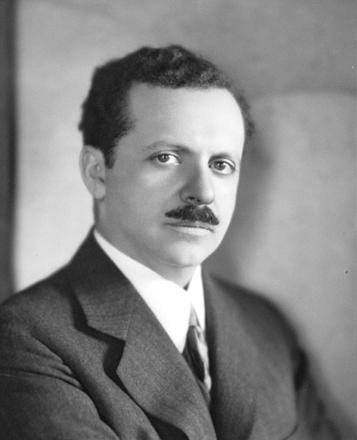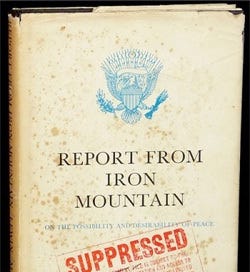
Discover more from Frederick R. Smith Speaks
Edward Bernays and Propaganda
Edward Bernays was a pioneering figure in the field of public relations and propaganda. He was born in Vienna, Austria, in 1891 and immigrated to the United States with his family in 1892.
The important point to the propagandist is that the relative value of the various instruments of propaganda, and their relation to the masses, are constantly changing. If he is to get full reach for his message he must take advantage of these shifts of value the instant they occur.
Edward Bernays
Edward Bernays, Brief Biography
Edward Bernays (1891–1995) was a pioneering public relations and propaganda figure. He was born in Vienna, Austria, in 1891 and immigrated to the United States with his family in 1892. He graduated from Cornell University in 1913 and worked as a press agent for the American Red Cross during World War I. After the war, he began working as a public relations consultant and quickly established himself as a leading expert in the field.
Bernays is often referred to as the “father of public relations” due to his innovative and influential work in the field. He is credited with developing many techniques and strategies still used in modern public relations, including psychological research to understand and influence public opinion. He also wrote several influential books on the subject, including Crystallizing Public Opinion (1923) and Propaganda (1928).
One of Bernays’ most notable campaigns was his work for the American Tobacco Company, in which he helped to change societal norms and make smoking socially acceptable for women. He did this by hiring beautiful women to light cigarettes in public and linking smoking with freedom and women’s liberation.
In addition to his work in public relations, Bernays also worked as a political consultant and advised several presidents, including Calvin Coolidge (1923-1929) and Franklin D. Roosevelt (1882-1945). He also worked on several high-profile corporate campaigns and helped to shape the public’s perceptions of companies such as Procter & Gamble, General Electric, and the American Meat Institute. Bernays died in 1995 at the age of 103.
Book Review, Propaganda
“Propaganda” is a book by Edward Bernays, published in 1928. In it, Bernays lays out his theories on the use of propaganda in modern society and how it can influence public opinion and shape societal norms. The book is considered a seminal work in the field of public relations and is still widely read and studied today.
In the book, Bernays asserts that propaganda is necessary for the modern society and can be used for good and bad purposes. He argues that propaganda can shape public opinion in a way that promotes the greater good, such as encouraging people to exercise more or eat healthier. He also acknowledges that propaganda can be used for nefarious purposes, such as manipulating people into supporting a particular political agenda or buying a specific product.
One of the key ideas in the book is the concept of “engineering consent.” Bernays argues that understanding the underlying psychological and emotional drivers of human behavior makes it possible to create propaganda that will influence people’s thoughts and actions in a desired way. He also emphasizes the importance of using experts and specialists, such as psychologists and sociologists, to help create effective propaganda campaigns.
Bernays also discusses the role of the media in shaping public opinion and how it can be used as a propaganda tool. He asserts that the media can shape people’s perceptions of the world and that it is essential to use this power responsibly.
In the book, Bernays also touches on democracy and how propaganda can be used to maintain it. He argues that in a democracy, the public must be informed and educated to make informed decisions. He also believes that propaganda can create a sense of unity and shared values among the citizens, which is essential for a stable democracy. Here are select quotes from each chapter of Propaganda.
Chapter I Organizing Chaos
THE conscious and intelligent manipulation of the organized habits and opinions of the masses is an important element in democratic society. Those who manipulate this unseen mechanism of society constitute an invisible government which is the true ruling power of our country. … Our Constitution does not envisage political parties as part of the mechanism of government, and its framers seem not to have pictured to themselves the existence in our national politics of anything like the modern political machine. … Ever since then we have agreed, for the sake of simplicity and practicality, that party machines should narrow down the field of choice to two candidates, or at most three or four.
Chapter II The New Propaganda
Modern propaganda is a consistent, enduring effort to create or shape events to influence the relations of the public to an enterprise, idea or group. ... This practice of creating circumstances and of creating pictures in the minds of millions of persons is very common. Virtually no important undertaking is now carried on without it, whether that enterprise be building a cathedral, endowing a university, marketing a moving picture, floating a large bond issue, or electing a president. Sometimes the effect on the public is created by a professional propagandist, sometimes by an amateur deputed for the job. The important thing is that it is universal and continuous; and in its sum total it is regimenting the public mind every bit as much as an army regiments the bodies of its soldiers.
Chapter III The New Propagandists
Many persons still believe that the public relations counsel is a propagandist and nothing else. But, on the contrary, the stage at which many suppose he starts his activities may actually be the stage at which he ends them.
Chapter IV The Psychology of Public Relations
The systematic study of mass psychology revealed to students the potentialities of invisible government of society by manipulation of the motives which actuate man in the group. Trotter and Le Bon, who approached the subject in a scientific manner, and Graham Wallas, Walter Lippmann and others who continued with searching studies of the group mind, established that the group has mental characteristics distinct from those of the individual, and is motivated by impulses and emotions which cannot be explained on the basis of what we know of individual psychology. So the question naturally arose: If we understand the mechanism and motives of the group mind, is it not possible to control and regiment the masses according to our will without their knowing it?
Chapter V Business and the Public
Continuous interpretation is achieved by trying to control every approach to the public mind in such a manner that the public receives the desired impression, often without being conscious of it. High-spotting, on the other hand, vividly seizes the attention of the public and fixes it upon some detail or aspect which is typical of the entire enterprise. When a real estate corporation which is erecting a tall office building makes it ten feet taller than the highest sky-scraper in existence, that is dramatization.
Chapter VI Propaganda and Political Leadership
The political apathy of the average voter, of which we hear so much, is undoubtedly due to the fact that the politician does not know how to meet the conditions of the public mind. He cannot dramatize himself and his platform in terms which have real meaning to the public. Acting on the fallacy that the leader must slavishly follow, he deprives his campaign of all dramatic interest. An automaton cannot arouse the public interest. A leader, a fighter, a dictator, can. But, given our present political conditions under which every office seeker must cater to the vote of the masses, the only means by which the born leader can lead is the expert use of propaganda.
Chapter VII Women’s Activities and Propaganda
In politics, the American women to-day occupy a much more important position, from the standpoint of their influence, in their organized groups than from the standpoint of the leadership they have acquired in actual political positions or in actual office holding. The professional woman politician has had, up to the present, not much influence, nor do women generally regard her as being the most important element in question. Ma Ferguson, after all, was simply a woman in the home, a catspaw for a deposed husband; Nellie Ross, the former Governor of Wyoming, is from all accounts hardly a leader of statesmanship or public opinion.
Chapter VIII Propaganda for Education
Many colleges have already developed intelligent propaganda in order to bring them into active and continuous relation with the general public. A definite technique has been developed in their relation to the community in the form of college news bureaus . … These problems include the education of the alumnus and his effect upon the general public and upon specific groups, the education of the future student to the choice of the particular college, the maintenance of an esprit de corps so that the athletic prowess of the college will not be placed first, the development of some familiarity with the research work done in the college in order to attract the attention of those who may be able to lend aid, the development of an understanding of the aims and the work of the institution in order to attract special endowments for specified purposes.
Chapter IX Propaganda and Social Service
THE public relations counsel is necessary to social work. And since social service, by its very nature, can continue only by means of the voluntary support of the wealthy, it is obliged to use propaganda continually. The leaders in social service were among the first consciously to utilize propaganda in its modern sense.
Chapter X Art and Science
In applied and commercial art, propaganda makes greater opportunities for the artist than ever before. This arises from the fact that mass production reaches an impasse when it competes on a price basis only. … the artist has the opportunity of collaborating with industry in such a way as to improve the public taste, injecting beautiful instead of ugly motifs into the articles of common use, and, furthermore, securing recognition and money for himself.
Chapter XI The Mechanics of Propaganda
The important point to the propagandist is that the relative value of the various instruments of propaganda, and their relation to the masses, are constantly changing. If he is to get full reach for his message he must take advantage of these shifts of value the instant they occur. Fifty years ago, the public meeting was a propaganda instrument par excellence. To-day it is difficult to get more than a handful of people to attend a public meeting unless extraordinary attractions are part of the program. The automobile takes them away from home, the radio keeps them in the home, the successive daily editions of the newspaper bring information to them in office or subway, and also they are sick of the ballyhoo of the rally.
Analysis
The book Propaganda (1928) is a classic work that started a revolution in the control of society. However, the writing is difficult to follow (compared to today’s writing style), emphasizing anecdotal information and lacking an objective classification of operational techniques that would provide a “Playbook.”
The assumption of control by an elite that we see today started around 1900 to 1920. The industrial revolution created new individual powers and laid a philosophical foundation, but the technologies and techniques were crude. Nevertheless, the elite has maintained cohesion. Today, they express the concepts of this book now with the creation of the levers of social media influence.
As a follow-up, this 1957 United States Military educational video is a good primer on spotting propaganda from an anti-communist perspective. Today, we know the modern “corporatocracy”1 employs the same methods but with modern tools to usher in a western half-baked New World Order.
Back to the Future
Today, three global Western news agencies provide the most international news coverage. They include Associated Press (AP), Reuters, and Agence France-Presse (AFP). Unless at least one of these news agencies sends a notice, national and local media are unlikely to report on an event. Most photos and videos come from these global news agencies. This way, people hear, see and read the same message everywhere.
Intelligence agencies and defense ministries know and use these news agencies’ power. In 2009, then-president of the AP, Tom Curley, let it slip that the U.S. Pentagon has more than 27,000 PR specialists. This cadre spins up stories and an annual propaganda budget of $5 billion. The rest of the corporatocracy apparatus uses these news agencies. They do so for the same reasons — to proliferate certain narratives while burying or “debunking” others.
One burning example is The Department of Homeland Security. Its Cybersecurity and Infrastructure Security Agency (CISA) partners with a censorship consortium. Through the Election Integrity Partnership (EIP) consortium, the CISA censors Americans. This blatant and illegal operation cancels our right to free speech.

Conclusion
Edward Bernays’ legacy continues to be felt in public relations, and his ideas are still widely studied and debated. In conclusion, Propaganda is a groundbreaking book that provides insight into the power of propaganda in shaping public opinion and societal norms. Bernays’ ideas and theories remain relevant today, and his book remains an essential read for anyone interested in the field of public relations, media studies, and social psychology. 📕
Sources and Recommend Reading
Torches of Freedom Campaign ~ Digital History
Propaganda ~ by Edward Bernays ~ 159 pages ~ Horace Liveright (publisher) ~ 1928
The manipulation of the American mind: Edward Bernays and the birth of public relations ~ by Richard Gunderman ~ theconversation.com
Pioneer Edward Bernays ~ The Museum of Public Relations
Edward Bernays ~ SourceWatch.org
The Propaganda Multiplier: How Global News Agencies and
Western Media Report on Geopolitics ~ Swiss Policy Institute
Corporatocracy is the modern fusion of legacy media, woke big business, the medical industry, and academia. This unholy alliance cancels clear thinking, national sovereignty, sound money, and the incentive to work.






![Propaganda by [Edward Bernays, Mark Crispin Miller] Propaganda by [Edward Bernays, Mark Crispin Miller]](https://substackcdn.com/image/fetch/w_1456,c_limit,f_auto,q_auto:good,fl_progressive:steep/https%3A%2F%2Fsubstack-post-media.s3.amazonaws.com%2Fpublic%2Fimages%2F182aa49f-9eaf-47f8-8997-1b57db1c3465_319x500.jpeg)











Excellent. Thank you. Bernays and his famous book get referenced a lot, but seldom covered to the extent they should, given how profound their impact was and continues to be. I'll be saving this article!
Still digesting this post. It covers a great deal of important ground in my view. It is important to see the depths of the serial abuse we are exposed to. Advertising is one of the many daily assaults to our consciousness. We can turn off most of it but not all. Even if we do reject all mass media there is still billboards, advertisements on telephone systems at medical facilities, corporations. It is all serial abuse.